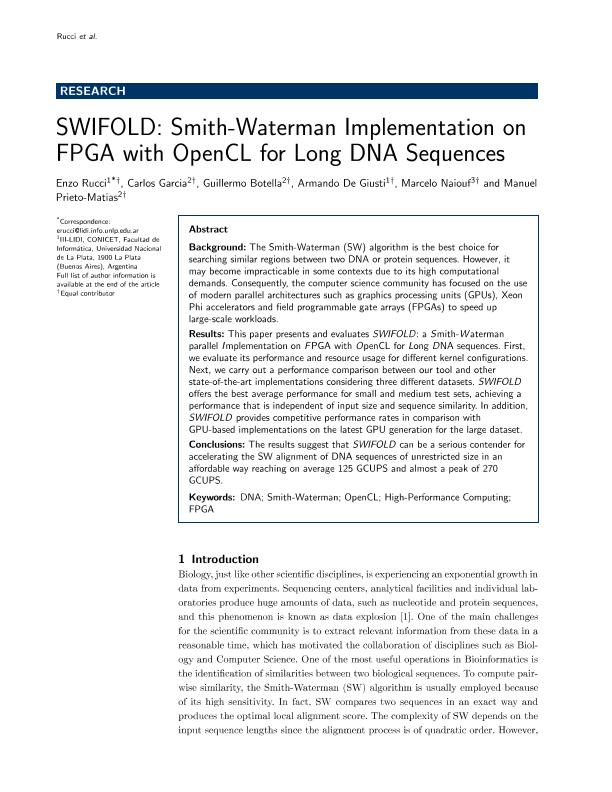Artículo
SWIFOLD: Smith-Waterman Implementation on FPGA with OpenCL for long DNA sequences
Rucci, Enzo ; García Sanchez, Carlos; Botella, Guillermo Juan; de Giusti, Armando Eduardo
; García Sanchez, Carlos; Botella, Guillermo Juan; de Giusti, Armando Eduardo ; Naiouf, Ricardo Marcelo; Prieto Matías, Manuel
; Naiouf, Ricardo Marcelo; Prieto Matías, Manuel
 ; García Sanchez, Carlos; Botella, Guillermo Juan; de Giusti, Armando Eduardo
; García Sanchez, Carlos; Botella, Guillermo Juan; de Giusti, Armando Eduardo ; Naiouf, Ricardo Marcelo; Prieto Matías, Manuel
; Naiouf, Ricardo Marcelo; Prieto Matías, Manuel
Fecha de publicación:
02/2018
Editorial:
BioMed Central
Revista:
Bmc Systems Biology
ISSN:
1752-0509
Idioma:
Inglés
Tipo de recurso:
Artículo publicado
Clasificación temática:
Resumen
Background: The Smith-Waterman (SW) algorithm is the best choice for searching similar regions between two DNA or protein sequences. However, it may become impracticable in some contexts due to its high computational demands. Consequently, the computer science community has focused on the use of modern parallel architectures such as graphics processing units (GPUs), Xeon Phi accelerators and field programmable gate arrays (FPGAs) to speed up large-scale workloads. Results: This paper presents and evaluates SWIFOLD: a Smith-Waterman parallel Implementation on FPGA with OpenCL for Long DNA sequences. First, we evaluate its performance and resource usage for different kernel configurations. Next, we carry out a performance comparison between our tool and other state-of-the-art implementations considering three different datasets. SWIFOLD offers the best average performance for small and medium test sets, achieving a performance that is independent of input size and sequence similarity. In addition, SWIFOLD provides competitive performance rates in comparison with GPU-based implementations on the latest GPU generation for the large dataset. Conclusions: The results suggest that SWIFOLD can be a serious contender for accelerating the SW alignment of DNA sequences of unrestricted size in an affordable way reaching on average 125 GCUPS and almost a peak of 270 GCUPS.
Palabras clave:
DNA
,
Smith-Waterman
,
OpenCL
,
HPC
Archivos asociados
Licencia
Identificadores
Colecciones
Articulos(CCT - LA PLATA)
Articulos de CTRO.CIENTIFICO TECNOL.CONICET - LA PLATA
Articulos de CTRO.CIENTIFICO TECNOL.CONICET - LA PLATA
Citación
Rucci, Enzo; García Sanchez, Carlos; Botella, Guillermo Juan; de Giusti, Armando Eduardo; Naiouf, Ricardo Marcelo; et al.; SWIFOLD: Smith-Waterman Implementation on FPGA with OpenCL for long DNA sequences; BioMed Central; Bmc Systems Biology; 12; 96; 2-2018; 43-53
Compartir
Altmétricas



